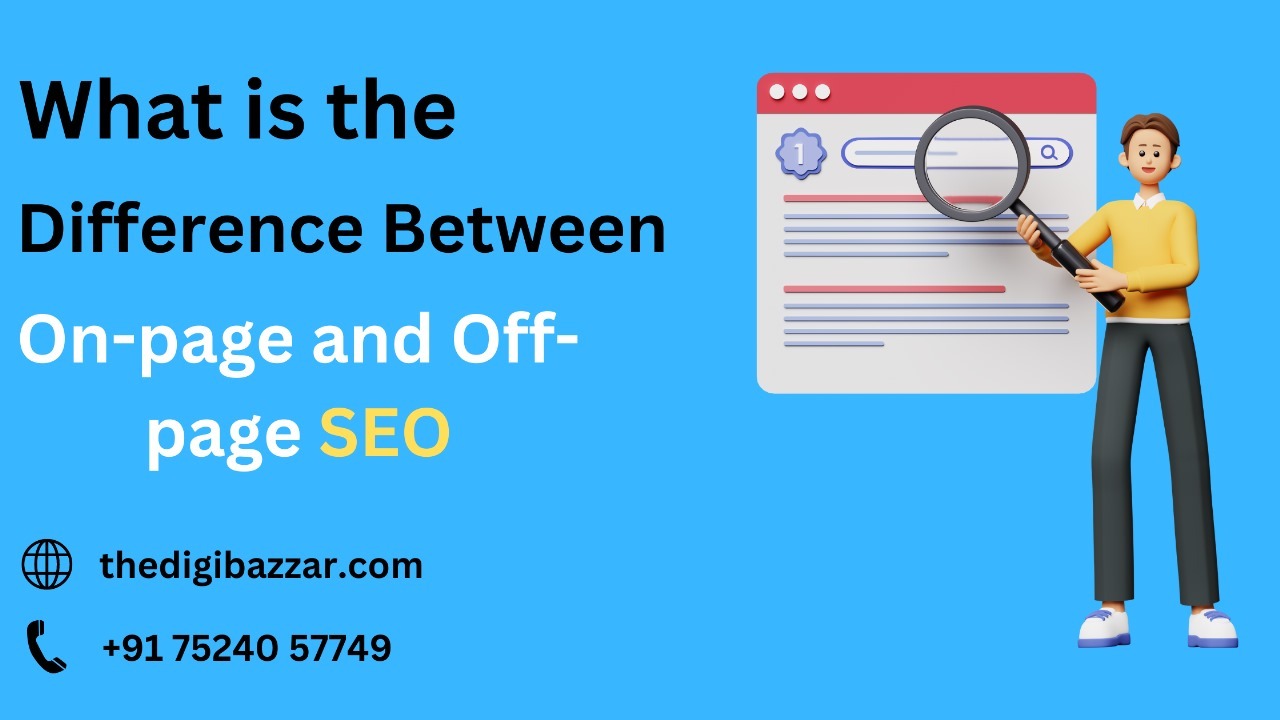What is the Difference Between On-Page and Off-Page SEO?
Search Engine Optimization (SEO) is important for improving website visibility and driving organic traffic. Understanding the difference between on-page and off-page SEO is essential for developing a comprehensive SEO strategy. Let’s know what is the difference between on-page and off-page SEO and why partnering with the best SEO company in Varanasi can help you achieve your business goals.
On-Page SEO
On-page SEO refers to the optimization techniques applied directly to your website to improve its search engine rankings. These tactics focus on enhancing the content and structure of your site to make it more appealing to both users and search engines. Key components of on-page SEO include:
1. Content Quality: High-quality, relevant, and engaging content is the cornerstone of on-page SEO. Ensure your content answers users’ queries, provides value, and is regularly updated.
• Tool: Grammarly helps you ensure your content is clear and error-free.

2. Keyword Optimization: Integrate relevant keywords naturally throughout your content, including in titles, headers, meta descriptions, and body text. This helps search engines understand the topic of your page.
• Tool: Ahrefs Keywords Explorer provides keyword suggestions and insights.

3. Meta Tags: Use compelling meta titles and descriptions to improve click-through rates from search engine results pages (SERPs). These tags should accurately describe the content of your page and include primary keywords.
• Tool: Yoast SEO for WordPress simplifies meta tag creation and optimization.

4. URL Structure: Create clean, descriptive URLs that include relevant keywords and are easy to read. Avoid using complex strings of numbers or irrelevant characters.
• Tool: Screaming Frog helps audit and improve URL structures.

5. Internal Linking: Link to other relevant pages on your site to help search engines understand the structure and hierarchy of your content. This also keeps users engaged by providing them with additional resources.
• Tool: Link Whisper assists in finding internal linking opportunities.

6. Mobile-Friendliness: Ensure your website is responsive and performs well on mobile devices. With the increasing use of mobile search, having a mobile-friendly site is crucial for SEO optimization.
• Tool: Google Mobile-Friendly Test checks your site’s mobile compatibility.

7. Page Speed: Optimize your site’s loading speed by compressing images, leveraging browser caching, and minimizing JavaScript. Fast-loading pages improve user experience and are favored by search engines.
• Tool: GTmetrix analyzes and suggests improvements for page speed.

Off-Page SEO
Off-page SEO involves optimization techniques that occur outside of your website but still impact your search engine rankings. These tactics are aimed at building your site’s reputation and authority. Key components of off-page SEO include:
1. Backlink Building: Acquire high-quality backlinks from reputable websites. Backlinks act as votes of confidence from other sites, signaling to search engines that your content is valuable and trustworthy.
• Tool: Moz Link Explorer helps you find and analyze backlink opportunities.

2. Social Media Engagement: Promote your content on social media platforms to increase visibility and drive traffic to your site. Engaging with your audience on social media can also lead to more backlinks and brand mentions.
• Tool: Buffer helps manage and schedule social media posts.

3. Guest Blogging: Write guest posts for other websites within your industry. This not only provides backlinks but also exposes your content to a wider audience.
• Tool: Pitchbox streamlines the outreach process for guest blogging.

4. Influencer Outreach: Collaborate with influencers in your niche to promote your content. Influencers can help amplify your message and drive traffic to your site.
• Tool: BuzzSumo helps identify and connect with influencers.

5. Online Directories and Listings: Ensure your business is listed in relevant online directories and local listings. This helps improve your site’s visibility in local search results.
• Tool: Yext manages and syncs your business listings across multiple directories.

6. Brand Mentions: Monitor and encourage mentions of your brand across the web. Even without direct backlinks, brand mentions can positively influence your site’s authority and relevance.
• Tool: Google Alerts notifies you of new brand mentions.

Combining On-Page and Off-Page SEO
A successful SEO strategy involves a balanced combination of both on-page and off-page SEO techniques. While on-page SEO ensures your website is optimized for search engines and users, off-page SEO helps build your site’s authority and reputation in the digital landscape.
Here are a few SEO tricks to integrate both approaches:
• Create High-Quality Content: Focus on producing valuable, shareable content that naturally attracts backlinks and social media engagement.
• Leverage Analytics: Use tools like Google Analytics to monitor your SEO performance and adjust your strategies accordingly.
• Build Relationships: Network with other bloggers, influencers, and industry leaders to create opportunities for guest blogging and collaborations.
• Stay Updated: Keep abreast of the latest SEO trends and algorithm updates to ensure your strategies remain effective.
